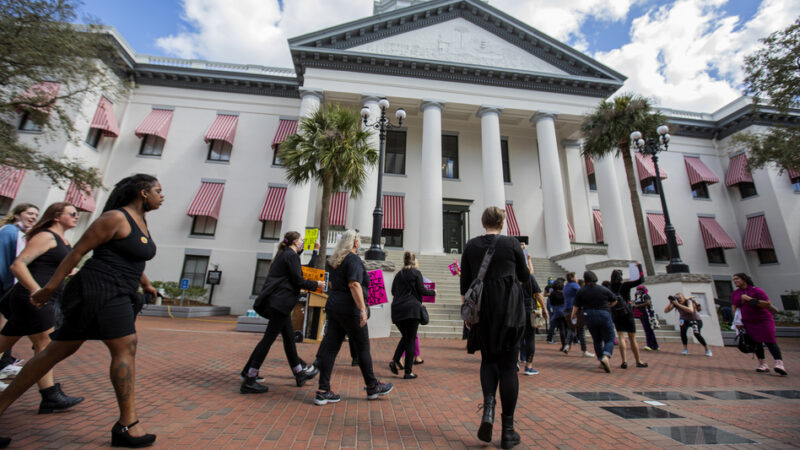Good morning. You’re reading the Up First newsletter. Subscribe here to get it delivered to your inbox, and listen to the Up First podcast for all the news you need to start your day.
Today’s top stories
Abortion will be the most important issue on Florida’s ballot this November, thanks to two rulings released yesterday. Florida voters will decide whether to enshrine abortion rights in their constitution in November after the state’s Supreme Court allowed a proposed amendment onto the ballot. The same court allowed a 15-week abortion ban enacted in 2022 to go into effect.
The 15-week abortion ban paves the way for a six-week ban that was enacted last year to take effect by May 1. In November, Floridians will be able to vote on the right to abortion “before viability,” which is usually 24 weeks.
In states where abortion has been on the ballot, voters have shown up overwhelmingly to support abortion rights, NPR’s Greg Allen explains on Up First. The move has also boosted midterm voter turnout in states like Ohio and Kansas. In the 2020 presidential election, Donald Trump won Florida, but having abortion on the ballot changes the expectations about who comes out to vote. Here’s what to know about abortion and the 2024 election.
Iran has vowed to retaliate after it accused Israel of bombing its embassy compound in Syria. The attack killed a top military commander and his deputy. Israel has not confirmed it was responsible, though it rarely comments on this kind of attack.
On Up First, Jane Arraf explains that striking a military target is one thing, but attacking an embassy, which is considered sovereign territory, is a “different ballgame.” Governments outside of the region have feared that an attack like this could cause the war in Gaza to spill into other regions.
In a separate airstrike, a U.S.-based aid group founded by celebrity chef José Andrés said seven aid workers in Gaza were killed while distributing food it sent by sea. World Central Kitchen has said it’s pausing its mission after the armored vehicles clearly marked with the company’s logo were hit on Monday. Reporting from Amman, Jordan, Arraf says it’s “unprecedentedly hard” for journalists to verify what’s happening.
Google will destroy the private browsing data/history of millions of people who used the “incognito” mode as part of a settlement filed to federal court yesterday. For years, people who used Google Chrome’s “incognito” mode were informed that they could browse privately when they turned on the supposedly untraceable browsing option, but a 2020 class action lawsuit showed that the tech giant continued to scrape searches through the advertising tools used by websites. Google then used this data to measure web traffic and sell ads to its users.
This is just a reminder that nothing we do online is invisible, NPR’s Bobby Allyn reports on Up First. In internal emails obtained by the lawyers, one Google engineer wrote that incognito mode’s “spy guy” branding was misleading. Allyn adds that Google got something out of this too. It won’t be paying any monetary damage to consumers or any fines.
Deep Dive
1 in 10 people of Asian descent live in poverty in the U.S. A new report from the Pew Research Center looked into economic hardship among Asian Americans – a vastly diverse group – both by the numbers and on a personal level. These were some of the findings:
Poverty rates vary greatly across the group, with Burmese, Hmong and Mongolian having some of the highest poverty rates among Asian Americans.
New York, San Francisco and Los Angeles together are home to 26% of all Asian Americans living in poverty.
1 in 5 survey respondents said they’d never asked for financial help from family members, friends or the government. Over half talked about not being able to save for emergencies.
Foreign- and U.S.-born Asian participants showed some differences. The former tended to see education as a key to escaping poverty, whereas the latter
Picture Show
The collapse of Baltimore’s Key Bridge is impacting the livelihoods of dockworkers and small waterfront businesses alike. Cruise companies were gearing up to open this year’s season. Now, besides not wanting to hamper the recovery mission, they have other concerns – like people coming on them only to get a better view of the wreck.
See photos and read about the people and places that have been left in limbo after the bridge collapse.
Before You Go
A proposal by the U.S. Fish and Wildlife Service to kill half a million barred owls to protect the endangered northern spotted owl has been controversial, but the USFWS says it’s the only way to ensure both owls survive.
A federal judge in Boston has ruled that migrants who were flown to Martha’s Vineyard can sue the Florida company that took them there.
The Texas Department of State Health announced that a person exposed to infected dairy cattle became ill with bird flu. It’s the first human case of the highly pathogenic strain of avian influenza in Texas, and it’s the second recorded in the U.S.
This newsletter was edited by Majd Al-Waheidi. Suzanne Nuyen and Anandita Bhalerao contributed.
Copyright 2024 NPR. To see more, visit https://www.npr.org.
9(MDA2ODEyMDA3MDEyOTUxNTAzNTI4NWJlNw004))
9(MDA2ODEyMDA3MDEyOTUxNTAzNTI4NWJlNw004))


